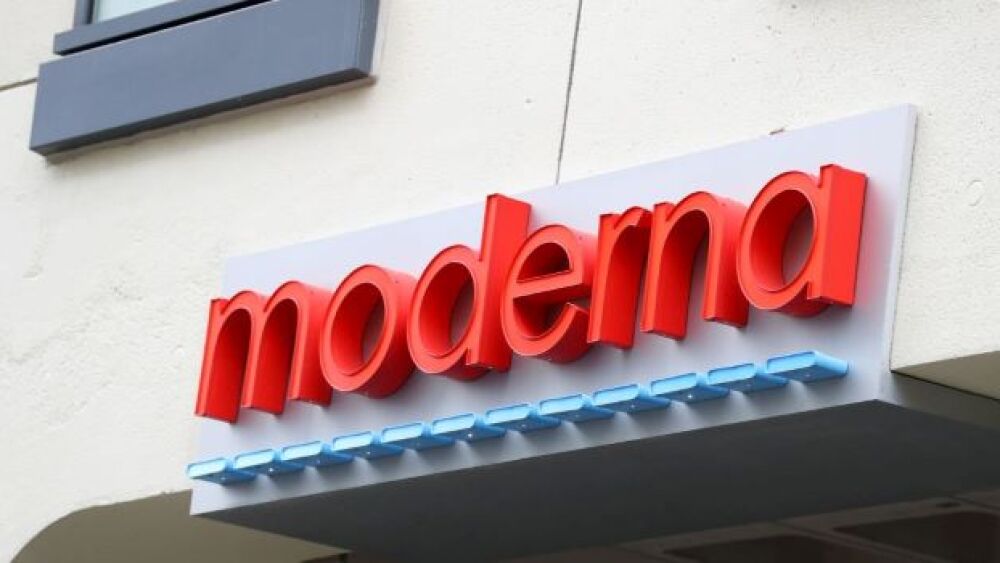Moderna responded to claims that the government should be co-patent owners of the mRNA vaccine developed by the company and said its mRNA sequence was exclusively selected by Moderna scientists.
Maddie Meyer/Getty Images
In a rebuttal to the National Institutes of Health’s claims on its COVID-19 patents, Moderna said Moderna scientists exclusively selected its RNA sequence. Also, the company said the sequence was selected with Moderna technology and without the input of NIH scientists.
On Thursday, Moderna issued a response to claims that the government should be listed as co-patent owners of the mRNA vaccine developed by the company. In its statement, Moderna said it recognizes the “substantial role” that scientists from the National Institute of Allergy and Infectious Diseases (NIAID), a division of the NIH helmed by Dr. Anthony Fauci, has played in the development of the vaccine. Moderna said the contributions made by the NIH are highly valued. The company said it has included the NIAID scientists on some patent applications for research where they have made “inventive contributions.”
Moderna said it does not agree that NIAID scientists co-invented claims to the mRNA sequence of its COVID-19 vaccine. The company said when it selected the mRNA sequence, it was done so without the input of government scientists “who were not even aware of the mRNA sequence until after the patent application had already been filed.” Therefore, according to the company, only their scientists could be listed as inventors on those claims. Additionally, the company cited strict rules related to U.S. patent law regarding who could be listed as an inventor on the patent.
“Just because someone is an inventor on one patent application relating to our COVID-19 vaccine does not mean they are an inventor on every patent application relating to the vaccine,” Moderna said in its statement.
As BioSpace previously reported, ownership of the patents is critical for licensing deals. Co-ownership of those patents would allow the U.S. government to allow others to use the intellectual property without the consent of Moderna. That could be significant given the lack of access to vaccines in some parts of the world. It would also highlight the role government scientists played in developing the vaccine.
Moderna said its findings are supported by the NIAID’s patent filings, specifically one from February 2020 filed in conjunction with the University of Texas. Moderna said NIAID scientists claim to have invented what Moderna called “similar subject matter.” The company said as a “legal and practical matter,” the same thing cannot be claimed to have been invented twice by the same people working with two different collaborators.
“For those who would seek to twist Moderna’s good faith application of U.S. patent law into something else, nothing could be further from the truth. Moderna remains the only company to have pledged not to enforce its COVID-19 intellectual property during the pandemic. Moreover, on September 29, Moderna offered to resolve its dispute with NIAID by making the government co-owners of those patent applications that only listed Moderna scientists as inventors, including the right as co-owners to license the patents as they see fit,” the company said in its statement.
The spat with the NIH over patents comes as the company continues to seek authorization for use in pediatric and juvenile patients under 17. The U.S. Food and Drug Administration (FDA) continues to investigate concerns of rare heart inflammation observed in teenage patients.
While the company awaits that decision, during an earnings call this week, Moderna Chief Medical Officer Dr. Paul Burton pointed to data showing its vaccine in adult patients. According to CNBC, Burton cited data from the U.S. Centers for Disease Control and Prevention (CDC) that showed fewer so-called breakthrough cases of COVID-19 in adults vaccinated with its medication compared to those with Pfizer or Johnson & Johnson’s vaccine. According to the data shared, 86 breakthrough cases per 100,000 received Moderna compared to 135 per 100,000 for the Pfizer and BioNTech vaccine.





